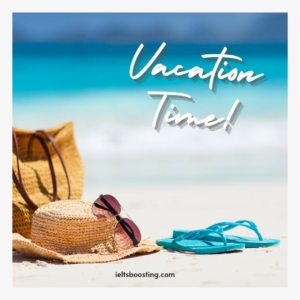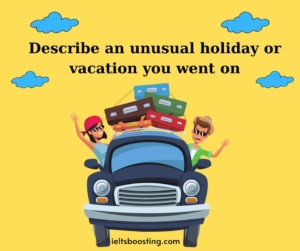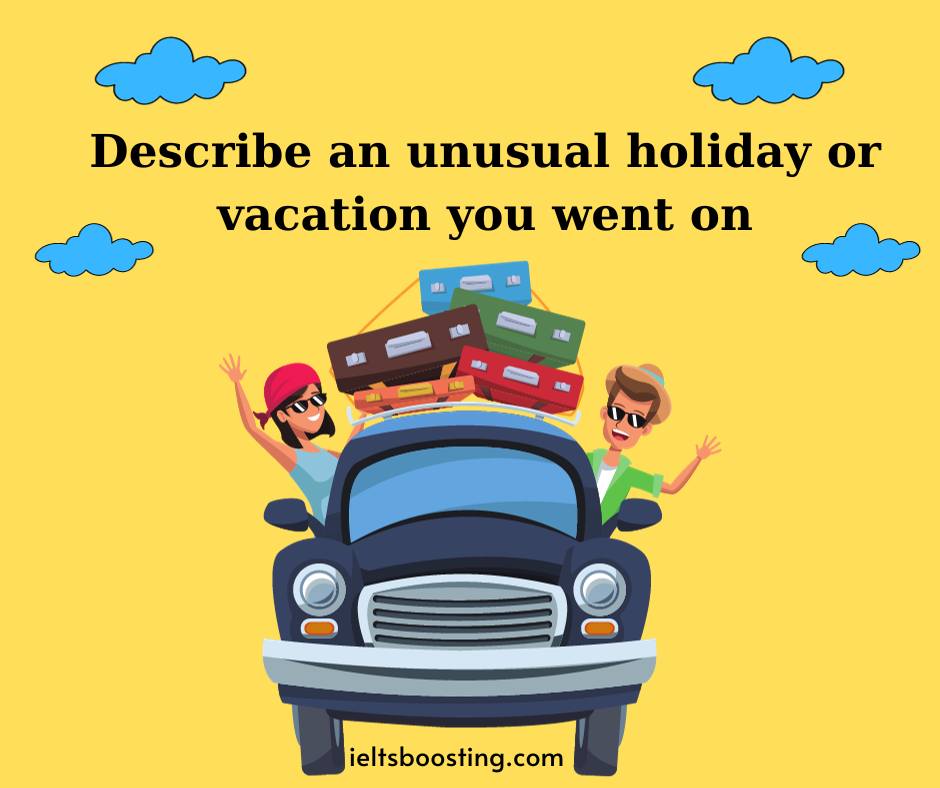Describe an unusual holiday or vacation you went on
You should say:
When and where you went
Who you went with
What you did there
And explain why it was unusual

Describe an unusual holiday or vacation you went on
Sample answer:
A few years back, I had an unusual vacation in Vietnam. It was during the summer, and instead of going to popular tourist spots like Ho Chi Minh City or Hanoi, my friends and I decided to explore the Mekong Delta. We were a group of four, all of us curious about experiencing the rural and authentic side of Vietnam.
Our journey through the Delta was fascinating. We traveled by boat through the intricate network of rivers and canals, passing by floating markets and traditional villages. The highlight was staying in a homestay right in the middle of a lush rice paddy. We got to experience the local way of life, including fishing and cooking traditional Vietnamese dishes with our hosts.
What made this holiday unusual was accommodation choice Instead of staying in hotels, we camped out in tents amidst the lush greenery of the Delta. However, this decision came with its own challenges, such as numerous mosquito bites, which also contributed to the rustic experience of our adventure.
The simplicity and beauty of rural Vietnam, coupled with the warmth of the local people and our unique camping experience, despite the mosquito bites, made it an unforgettable journey.
Combine with these topics or use these topics to save your time
Describe a place in your country that you are interested in
Describe a beautiful city that you have visited
Describe an occasion when you used a map
Vocabulary and collocations
- Unusual vacation: A holiday that is out of the ordinary or uncommon.
- Explore the Mekong Delta: To travel through and discover a specific region in Vietnam known for its waterways.
- Rural authenticity: The genuine and unspoiled character typical of the countryside.
- Fascinating journey: An extremely interesting or captivating travel experience.
- Intricate network: Complex and detailed interconnected system.
- Floating markets: Markets that are set up on boats or rafts on waterways.
- Traditional villages: Villages maintaining historic customs and ways of life.
- Lush rice paddy: A richly green and fertile field where rice is cultivated.
- Experience the local way of life: To live or engage in the daily customs and activities of the native people.
- Cooking traditional Vietnamese dishes: The act of preparing authentic cuisine from Vietnam.
- Accommodation choice: The selection or decision regarding where to stay.
- Camped out in tents: Temporary living in makeshift shelters during a trip.
- Amidst the lush greenery: Surrounded by abundant plant life and vegetation.
- Numerous mosquito bites: Multiple instances of being bitten by mosquitoes.
- Rustic experience: A experience characterized by a charming, rural quality.
- Simplicity and beauty: The state of being simple yet aesthetically pleasing.
- Warmth of the local people: The friendly and hospitable nature of the residents.
- Unforgettable journey: A memorable and impactful trip.

Describe an unusual holiday or vacation you went on
Part 3 – describe an unusual holiday or vacation you went on
Do you think people in your country have long enough holidays?
In Vietnam, I believe that the duration of holidays for most people is quite reasonable, though it could be better. Typically, employees are entitled to around 12 days of annual leave, which is modest compared to some other countries. However, we do have several public holidays and traditional festivals that add extra days off throughout the year. While these breaks provide a good opportunity for relaxation and family time, having slightly longer holidays could greatly enhance work-life balance and overall well-being.”
Useful Vocabulary:
- Duration: The time during which something continues.
- Annual leave: Paid time off work granted by employers to employees.
- Modest: Not excessively large, elaborate, or expensive.
- Public holidays: Days of celebration or commemoration when businesses and government offices are closed.
- Traditional festivals: Cultural celebrations specific to a region or community.
- Extra days off: Additional days when work is not required.
- Relaxation: The state of being free from tension and anxiety.
- Family time: Periods spent with family members.
- Work-life balance: The equilibrium between professional life and personal life.
- Overall well-being: The general condition of a person’s life, including health, happiness, and comfort.
Which holidays are popular in your country?
In my country, several holidays hold significant popularity among the people. Lunar New Year, also known as Tet, is undoubtedly the most celebrated, marking the beginning of the lunar calendar with family reunions and traditional festivities. Independence Day is another major holiday, commemorating our nation’s liberation with various patriotic events. Additionally, holidays like International Labor Day and the Mid-Autumn Festival are widely observed, each with its unique customs and celebrations
Useful Vocabulary:
- Lunar New Year (Tet): The beginning of the lunar calendar, celebrated with various traditional customs.
- Celebrated: Acknowledged or honored with festivities.
- Family reunions: Gatherings where family members come together.
- Traditional festivities: Celebrations following long-established customs.
- Independence Day: A day commemorating a country’s independence.
- Commemorating: Marking an event or person with remembrance.
- Patriotic events: Activities showing love for one’s country.
- International Labor Day: A day honoring workers and their contributions.
- Mid-Autumn Festival: A traditional festival celebrated in some Asian countries.
- Widely observed: Celebrated or acknowledged by many people.
What are the difference between old and young people when spending their holidays?
The holiday spending habits of old and young people in my country tend to differ significantly. Older generations often prefer more relaxed and traditional activities, such as family gatherings or visits to cultural sites. In contrast, younger people are more inclined towards adventurous and active holidays, like traveling to new destinations or engaging in outdoor sports. Additionally, younger individuals often embrace technology more, using apps and social media to plan and share their holiday experiences.”
Useful Vocabulary:
- Habits: Regular tendencies or practices.
- Relaxed: Free from tension and anxiety; at ease.
- Traditional activities: Conventional practices passed down through generations.
- Family gatherings: Occasions where family members come together.
- Cultural sites: Places of historical and cultural significance.
- Adventurous: Inclined to seek out new and daring experiences.
- Outdoor sports: Physical activities conducted in natural settings.
- Embrace technology: To readily and enthusiastically use technological tools.
- Apps: Short for applications, typically referring to software on digital devices.
- Social media: Websites and applications that enable users to create and share content or participate in social networking.

Describe an unusual holiday or vacation you went on
Do you think having holidays help people learn other countries’ cultures?
Definitely, holidays play a crucial role in facilitating cultural learning and exchange. When people travel to other countries, they get immersed in a different culture, experiencing firsthand its customs, language, and traditions. This direct exposure allows for a deeper understanding and appreciation of the diversity and complexity of other societies. Moreover, interacting with locals and participating in their cultural activities can significantly broaden one’s perspective and foster global awareness.
Useful Vocabulary:
- Crucial role: An extremely important or vital function.
- Facilitating: Making an action or process easy or easier.
- Cultural learning: The process of acquiring knowledge about a different culture.
- Immersed: Fully involved or engrossed in something.
- Firsthand experience: Direct observation or participation.
- Customs: Traditional practices or behaviors of a society.
- Appreciation: Recognition and enjoyment of the good qualities of someone or something.
- Diversity: Variety or a range of different things.
- Interacting: Communicating or engaging with others.
- Broaden one’s perspective: To expand someone’s viewpoint or understanding.
- Foster global awareness: To promote understanding and knowledge about the world.
Why do some people dislike holidays?
Some people might dislike holidays due to the crowds and increased prices often seen in popular destinations during peak times. The idea of dealing with busy airports, crowded tourist spots, and long queues can be off-putting. Additionally, for individuals who thrive on routine and structure, holidays can disrupt their sense of stability and productivity. Furthermore, there are those who simply prefer the tranquility and comfort of their own home and find traveling to be more exhausting than relaxing.”
Useful Vocabulary:
- Increased prices: Higher costs than usual.
- Popular destinations: Places frequently visited by tourists.
- Peak times: Periods of highest demand or activity.
- Crowded tourist spots: Places of interest that attract many visitors.
- Long queues: Lines of people waiting for something.
- Off-putting: Unpleasant, disconcerting, or repellent.
- Routine and structure: Regular, organized patterns of behavior.
- Sense of stability: Feeling of consistency and security.
- Productivity: The state of being productive or efficient.
- Tranquility: The quality or state of being tranquil; calm.
- Exhausting: Causing one to feel very tired; very tiring.


